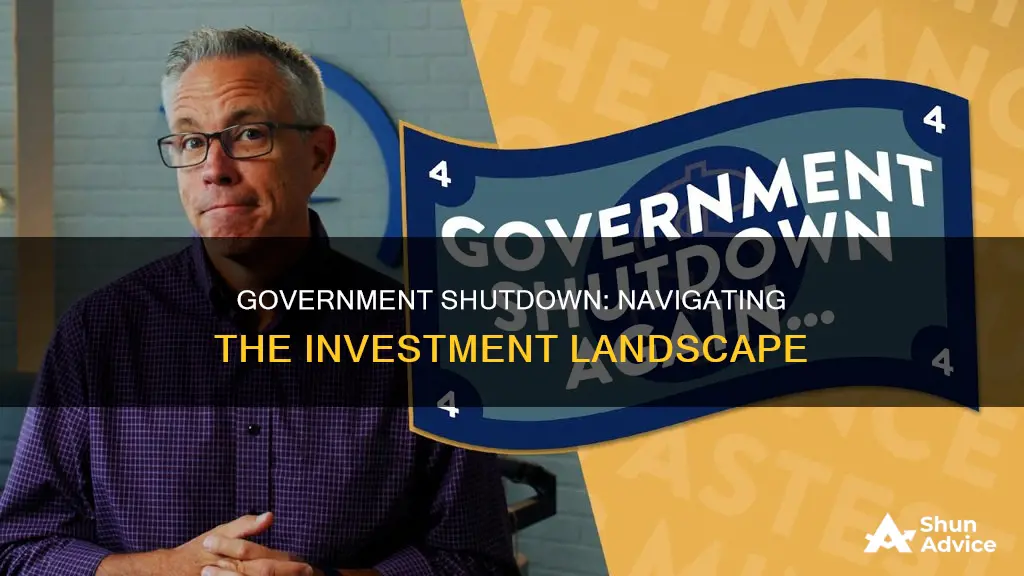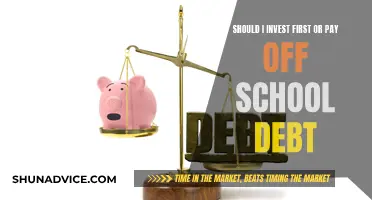
A government shutdown can be a scary prospect for investors, but history suggests that markets tend to emerge relatively unscathed from these periods of uncertainty. Since 1975, there have been 21 government shutdowns, with an average duration of 8 days. While these events can cause temporary volatility and disrupt economic output, they have had little impact on overall market performance. The S&P 500 has gained an average of 0.3% during shutdowns, and in the most recent example from 2018-2019, stocks rose over 9% while the government was shuttered.
However, it's important to note that each economic situation is unique, and a prolonged shutdown could have more significant consequences. Credit rating agencies have cited political polarization as a reason for downgrading the US government's credit rating, and a longer shutdown could dent confidence, impact growth, and increase fixed-income volatility.
| Characteristics | Values |
|---|---|
| Impact on stock market | Historically, government shutdowns have had little impact on the stock market. |
| Impact on bond market | The bond market has been less forgiving of government shutdowns. |
| Impact on GDP | A government shutdown may cause only modest losses in gross domestic product (GDP). |
| Impact on federal employees | Federal employees may not receive paychecks during a shutdown but will receive back pay when it ends. |
| Impact on federal services | "Nonessential" government services will be halted, while "essential" services, including public safety and mandatory programs such as Medicare, Social Security, and Veterans Affairs benefits, will continue. |
| Impact on consumer confidence | A government shutdown could dent confidence in the government's ability to get things done. |
What You'll Learn

The stock market tends to be unaffected by government shutdowns
While a government shutdown can be a scary headline, the stock market tends to be unaffected by it. Since 1975, there have been 21 government shutdowns, lasting an average of eight days, with the most recent one stretching over 34 days. However, the S&P 500 has gained an average of 0.3% during these shutdowns, with a median change of 0.0%, indicating that the stock market remains relatively stable despite the political turmoil.
This resilience can be attributed to several factors. Firstly, investors recognise that any economic disruptions caused by a shutdown are temporary. While government employees may not receive paychecks during that period, they are typically provided back pay once the shutdown ends. As Ross Mayfield, an investment strategy analyst at Baird, explains, this "just kind of shifts things around in time rather than permanently disrupting the economy."
Secondly, the inherently short-lived nature of shutdowns contributes to their minimal impact on the stock market. As Mayfield points out, "there's no winner" in a government shutdown, and both political parties tend to shoulder the blame. Consequently, these impasses are often resolved swiftly to minimise political fallout.
Additionally, historical data suggests that budget debates and disagreements have a more profound effect on stock performance than the shutdowns themselves. For instance, the S&P index fell 6.7% following a contentious debate over the debt ceiling in 2011. Similarly, the S&P 500's dip in September 2023 was influenced by various factors, including higher interest rates, the resumption of student loan payments, and rising oil prices.
While a government shutdown may not significantly impact the stock market, it can still introduce some volatility. A delay in vital economic data releases during a shutdown can increase uncertainty for investors and affect their decision-making. This was evident in the days leading up to the potential shutdown in September 2023, when the possibility contributed to a more than 5% dip in the S&P 500. However, once the shutdown is imminent or underway, the market has historically remained relatively stable.
C-Corp: Why Investors Choose This Structure
You may want to see also

A shutdown could slightly lower growth
While a government shutdown is unlikely to have a significant impact on investments, it could slightly lower growth. Goldman Sachs analysts predict a 0.15% drop in growth for each week of the shutdown. This is because the shutdown will disrupt an already pressured economy characterised by elevated interest rates and softening consumer sentiment.
A shutdown will also cause delays in paychecks and federal benefits, as well as reduced staffing at federal agencies and airports. More than 2 million civilian federal employees could be furloughed or forced to work without pay. Additionally, federal agencies that issue economic data will suspend services during the shutdown, further disrupting the economy.
However, it is important to note that the impact of a shutdown on growth may be temporary. During previous shutdowns, federal employees have received back pay once the shutdown ended. Moreover, shutdowns tend to be short-lived as both political parties want to avoid blame.
While a government shutdown may cause some short-term turbulence, investors with a long-term perspective can likely wait it out without significantly impairing their investment plans.
Retirement Investment Options: Exploring the Right Choices for Your Future
You may want to see also

The length of the shutdown matters
While government shutdowns have historically had a minimal impact on the economy and stock market, a prolonged shutdown could have more significant effects.
Impact on Economic Growth
Goldman Sachs analysts estimate that each week of a government-wide shutdown would reduce economic growth by around 0.15%. A longer shutdown means more time without fully functioning government departments, which could have a bigger impact on the economy. Federal Reserve Chair Jerome Powell has also stated that a government shutdown could weigh on economic growth.
Impact on Confidence
A prolonged shutdown could also dent confidence in the government's ability to get things done and manage the economy effectively. This could have broader implications for the country's credit rating and the attractiveness of US Treasuries as a safe-haven asset.
Impact on Specific Sectors
A prolonged shutdown could have a more significant impact on specific sectors that are highly dependent on government contracts, such as the defence and healthcare sectors. However, historically, these sectors have tended to rally during shutdowns, providing potential buying opportunities for investors.
Impact on Fixed-Income Volatility
A longer shutdown could also increase fixed-income volatility. While the government can still pay bondholders during shutdowns, temporary instability in bond prices may occur.
Bahamas: Foreign Investment Origins
You may want to see also

It could dent confidence in the government
A government shutdown could dent confidence in the government's ability to get things done. In August 2023, Fitch downgraded the US credit rating from AAA to AA+, with one of the reasons being "repeated debt-limit political standoffs and last-minute resolutions".
A country's credit rating is similar to a personal credit score. When the biggest economy in the world loses its AAA status, it's a reason to pay attention. Dan Suzuki, deputy chief investment officer at Richard Bernstein Advisors, said of the situation:
> "One issue is that this just delays the pain until November, and in the meantime, the political circus will probably ramp up and further corrode people’s confidence in the government."
The U.S. Chamber of Commerce also warned that a shutdown could shake confidence in the government's ability to fulfill its basic duties.
While government shutdowns have historically had a minimal direct impact on stock prices, there are still some practical measures investors can take to reduce near-term risk in their stock portfolios. For example, investors may want to look for opportunities in the defence and healthcare sectors, which are highly dependent on government contracts.
Retirement Plans and Investment Advisors: A Necessary Partnership?
You may want to see also

Fixed-income volatility could increase
While government shutdowns have historically had a minimal direct impact on stock prices, fixed-income volatility could increase.
Fixed-income securities are investments that provide a return through fixed periodic interest payments and the eventual return of principal at maturity. Bonds are the most common type of fixed-income security.
During a government shutdown, some federal employees may not receive paychecks, though they will receive back pay when the shutdown ends. This temporary disruption to the economy could cause some instability in bond prices. However, the impact on fixed-income volatility is not guaranteed to be negative. During the 1995-1996 shutdown, the MOVE Index, which measures bond market volatility, rose 7.2%. However, during the 2013 and 2018-2019 shutdowns, the same index fell 12.6% and 14.8%, respectively.
Despite the potential for increased volatility, U.S. government bonds remain attractive due to their high yields. Historically, the 10-year Treasury yield has fallen during government shutdowns, while their price has increased, indicating that investors view these bonds as a safe-haven asset during periods of uncertainty. Additionally, the government can still make coupon payments to bondholders during shutdowns.
In conclusion, while fixed-income volatility may increase during a government shutdown, the impact is not always negative, and U.S. government bonds can still be a desirable investment option due to their high yields and status as a safe-haven asset.
Investing: Personal Definitions of Risk and Reward
You may want to see also
Frequently asked questions
Historically, government shutdowns have not had a significant impact on the stock market or investors. However, there may be temporary instability and increased volatility in bond prices.
Since 1975, there have been 21 government shutdowns, with an average duration of 8 days. The S&P 500 has gained an average of 0.3% during these shutdowns, with 11 instances of trading higher and nine instances of trading lower.
A government shutdown may cause temporary instability in bond prices, but this is not a given. During previous shutdowns, the MOVE Index, which measures bond market volatility, has both increased and decreased.
The length of the shutdown is important. Longer shutdowns will have a more significant impact, particularly on federal workers and small businesses. Additionally, consider the broader economic context and investor sentiment.
Maintaining a long-term perspective is crucial. Short-term volatility may occur, but it is essential to stay focused on your investment goals and strategies. You may also consider opportunities in sectors highly dependent on government contracts, such as defence and healthcare.







